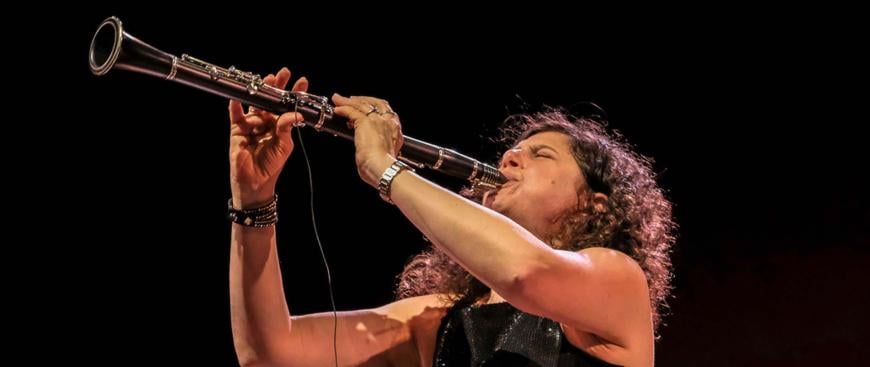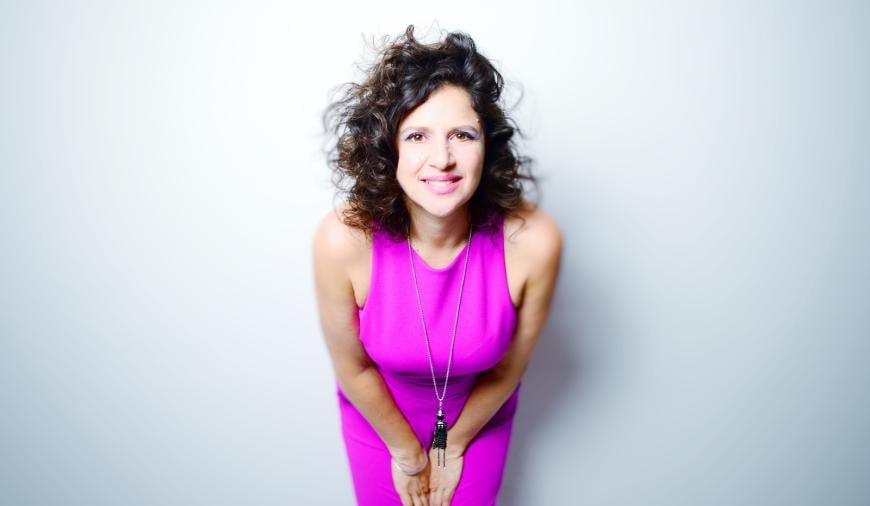
For Israeli jazz musicians, New York City is the promised land, and no 21st-century artist has imbibed Gotham’s milk and honey more deeply than Anat Cohen.
A rich, creamy-toned tenor saxophonist and startlingly lustrous clarinetist, the 47-year-old, Tel Aviv-born Cohen has created a capacious and cosmopolitan body of work ranging across jazz idioms and hybrid styles, from Benny Goodman tributes and cinematic orchestral suites to post-bop quintets and chamber settings for jazz and string quartets.
She wasn’t the first Israeli jazz musician to establish herself as a bona fide star in the U.S. That credit goes to bassist Avishai Cohen, who emerged in the late 1990s from Chick Corea’s sextet Origin and his New Trio as a composer and bandleader with his own world-jazz vision (now living in Israel, that Cohen shouldn’t be confused with Anat’s younger brother, the former SFJAZZ Collective trumpeter of the same name). But since her debut album as a leader, Place & Time, which was released in 2005 on the artist-friendly label she co-founded, Anzic Records, Cohen has maintained her high-visibility role in the vanguard of successive waves of exceptional Israeli musicians making a name for themselves in New York.
As a faculty member at the New School, which has served as a conduit for players from Israel for some three decades, Cohen sees firsthand that “the flow of musicians coming from Israel hasn’t stopped. My brother Avishai is back in Israel teaching, and young players there have role models already. They know it’s possible to study in Israel and come to New York, even though it’s changed and seems so much more challenging to survive in the city; the music gives so much inspiration. They understand where they are in the hierarchy, have respect for the masters, and know what they need to work on.”

She kicks off an impressive run of gigs around California Sunday afternoon March 20 at Half Moon Bay’s Bach Dancing & Dynamite Society and Monday at Santa Cruz’s Kuumbwa Jazz Center with Brazilian 7-string guitar master Marcello Gonçalves. The duo, which recently released a gorgeous album of classic Brazilian songs by the likes of Milton Nascimento, Caetano Veloso, and Gilberto Gil, Reconvexo, also plays the SFJAZZ Center on Thursday March 24 (her five-night SFJAZZ run starts the previous night with an onstage listening party and conversation with Randall Kline, the organization’s founder and executive artistic director).
The centerpiece of her SFJAZZ resident artistic director engagement features the Anat Cohen Tentet, on March 25-26. Under the musical direction of arranger Oded Lev-Ari, the group was assembled to explore a century of jazz evolution. They designed the unusual instrumentation “to be the most flexible large ensemble that could accompany the clarinet through all the different stories it can tell,” said Cohen.

Cohen released the band’s Grammy-nominated second album, Triple Helix, in 2020, showcasing the group’s sweeping command of jazz idioms and kindred musical currents. Stocked with an international cast of New York improvisers, the Tentet includes cellist Christopher Hoffman, trumpeter Josh Reed, and rising Brazilian jazz star Vitor Gonçalves, who expands the group’s palette by alternating between piano and accordion. “With these musicians, we can jump from klezmer to Brazilian choro to swing to jazz to rock,” Lev-Ari said.
She closes the SFJAZZ run Sunday, March 27 by introducing a new band Quartetinho, which gleans four members from the Tentet with Gonçalves, Israeli bassist Tal Mashiach doubling on guitar, and James Shipp on vibes, percussion, and some electronics. Cohen focuses on bass clarinet in the group, which she created “to explore more intimate, chamber jazz sounds,” she said.
“We played our first show on March 7, 2020 and the next day everything shut down. It’s a group I’ve been trying to play with ever since. I love these guys. It’s a different space. Everyone contributes some original music, and everyone has an affinity for Brazilian music, but with open space for improvisation and more folkloric sounds.”
No country outside the U.S. has contributed more songs to the jazz repertoire than Brazil, and it’s not uncommon to find jazz artists who have delved deeply into the country’s music. But Cohen is a special case. Much like she’s explored the jazz continuum from early New Orleans polyphony on, she’s devoted herself to choro, the instrumental Brazilian style that first merged African rhythms with European forms and instruments in late 19th-century Rio de Janeiro. Many of her albums have included instrumental arrangements of post-bossa nova Brazilian standards from the 1960s and ’70, a songbook often referred to as MPB (música popular brasileira).
That’s the body of music she explores with Marcello Gonçalves. Their first duo album, 2016’s Outra Coisa, focused on compositions by Moacir Santos, a brilliant musician who faded from view after leaving Brazil for a thwarted career writing scores for Hollywood films (his influence endured though through his student, guitarist composer Baden Powell). They recorded their second album Reconvexo while Cohen was hunkered down in Rio for much of 2020, inspired by performances livestreamed and recorded at home by iconic artists such as Caetano Veloso and Milton Nascimento.
“It started with Gilberto Gil’s ‘Andar Com Fé,’ with all these artists singing the song with him, like ‘We Are the World” she said. “At the end, Stevie Wonder is wishing Gil happy birthday. It was in the depths of the pandemic and very emotional.”
Gonçalves started the new project with Nascimento’s anthem “Maria Maria.” Like all his arrangements for Reconvexo, it’s intimately tied to the lyrics (by Fernando Brandt). He starts by printing out the words “and the message of the lyric guides me,” he said from his home in Rio. “I try to discover some interpretation that no one has taken and then try to figure out how to describe it in the music itself. Anat’s an amazing improviser, but besides that I love the way she ‘sings’ the melody. Dianne Reeves told her, ‘You play like a singer.’”
They had plenty of time to work on the pieces because Cohen spent much of 2020 hunkered down in Rio. Responding to the fraught moment in Brazil, with the pandemic spreading and an erratic president given to dismissing the advice of health professionals, the songs “reflect such a beautiful Brazil, such a poetic side,” Cohen said. “Marcello has been working for so many years with all the top singer/songwriters, and these songs are the beauty he wants to see in Brazil.”
One of the most esteemed masters of Brazil’s seven-string guitar style, Gonçalves wrote his doctoral dissertation on the tradition, which was forged in the cauldron of samba bands. Originally played on steel string guitar with a metal pick to cut through the percussion-driven ensembles, the seven-string idiom evolved onto nylon strings, and Gonçalves studied with the tradition’s primary architect Dino Sete Cordas (“Seven-String Dino,” 1918 – 2006).
“I learned his patterns and way of accompaniment and counterlines, but also the full range of the instrument,” he said. “You can also act as a classical guitarist, as an orchestra. That’s the way I like to play now. I use this particular Brazilian language. I consider myself a seven-string guitar player. I can play six, but something is missing.”

After her resident artistic director run, Cohen won’t be missing from the Bay Area for long. She returns May 26–29 for a four-night SFJAZZ engagement as part of the all-women band Artemis, which is under the direction of pianist, composer, and founding SFJAZZ Collective member Renee Rosnes. The sextet also celebrates Kuumbwa Jazz Center’s 45th-anniversary on May 31, and plays Santa Monica’s Broad Stage on June 4. The group combines well-established leaders — drummer Allison Miller and trumpeter Ingrid Jensen — with the rising younger players Nicole Glover on tenor sax and bassist Noriko Ueda.
“Renee is such an incredible arranger, musician, and player,” Cohen said, who focuses on clarinet in the group. “She writes for the people in the band. We did a week at Birdland in December and it was so nice to play for a few days straight. The music always develops. I know SFJAZZ’s Miner Auditorium is a big hall, but it feels small.”

